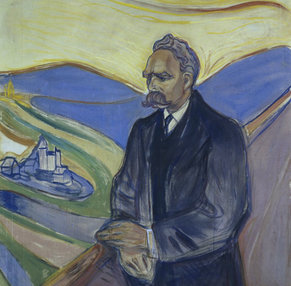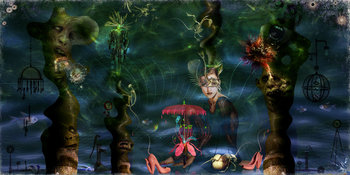
God is Dead
God is dead! God remains dead! And we have killed him! How can we console ourselves, the murderers of all murderers!Friedrich Nietzsche was concerned about the decline in religious belief that accompanied the modernism of his day. The statement above is Nietzsche playing Devil's advocate -- challenging us to imagine moral nihilism replacing shared value systems.
~ Friedrich Nietzsche, The Gay Science, 1882.
Moral Nihilism
Moral nihilism is the belief that no action is good and no action is bad. This calls for indifference to that which people commonly find repugnant and wrong.Last Man
The last man is the prediction of Friedrich Nietzsche that the decline in religious belief will produce a society obsessed with sustenance, comfort, convenience, entertainment and risk avoidance. Nietzsche refers to this state as the last man and views this as a return to an animal state of existence whereby humankind has no greater purpose than its own comfort and safety.Anomie
Anomie is a sense of disconnection from others due to a lack of shared experience, culture, norms and values. This term implies a state of suffering, disillusionment and confusion as opposed to joyful and confident individualism.Skepticism
Skepticism is the belief that human knowledge is limited or completely faulty. At its base is the argument that our senses could be some type of illusion or simulation such that we can't even trust what we observe and measure. Skeptics can potentially feel that life has meaning and value but that it is beyond our abilities to fully understand these things with any certainty.Philosophical Pessimism
Philosophical pessimism is a rejection of optimism and related concepts such as progress. As with skepticism, this isn't necessarily nihilism but often resembles it. For example, both would likely view a philanthropist's efforts to do good as likely to backfire or create unintended consequences.Relativism
Relativism is the belief that it is a universal truth that there are no universal truths. This views subjective experience as the only true reality with all attempts to unify things as inherently oppressive. For example, language is viewed as oppressive because it attempts to constraint or influence the mind of the individual. Relativism is considered a cornerstone of postmodern academic thought.Notes
Nihilism is often associated with the political philosophy of anarchism. However, this association isn't necessarily valid. Just because you would like to dismantle existing systems doesn't mean you feel life has no meaning or value.| Overview: Nihilism | ||
Type | ||
Definition | The belief that life has no meaning or value. | |
Related Concepts | ||





























